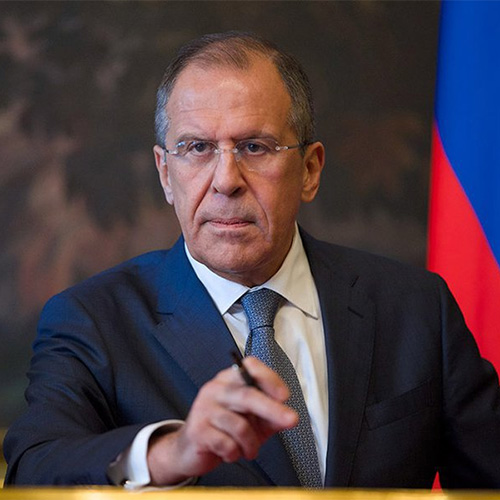By -Special investigation for Lanka-e-News

(Lanka-e-News - 02.Oct.2025, 11.20 PM) Sergey Lavrov, Russia’s long-serving foreign minister, is often described by colleagues and rivals alike as a diplomat forged in detail: quick to read the room, fluent in several languages and comfortable operating where power and patronage intersect. To understand the playbook that has underpinned Moscow’s foreign policy choices in the turbulent years since 2014, one must begin in an unexpected place — Colombo, Sri Lanka, where the young Lavrov spent his first posting after graduating MGIMO in 1972. That posting, his study of Sinhalese and early work across the Indian Ocean littoral, left him with skills — linguistic, cultural and operational — that would reappear again and again in his later diplomacy.
Lavrov left MGIMO in 1972 and was posted to the Soviet embassy in Sri Lanka, where he served for several years. He has said publicly that he learned Sinhalese while on that first assignment, a rare linguistic skill for a Russian diplomat that allowed him to operate with local nuance and to read regional dynamics beyond the usual cables and briefings. That early intimacy with South Asia — and with the Maldives through the Colombo mission’s remit — helped forge a durable comfort with low-visibility, long-term relationship building.
Those years also fed an approach to diplomacy that emphasises patient, tailor-made engagement: pick the fertile soil, plant the seed and tend it for years until influence grows. Analysts say Lavrov’s career demonstrates that method at scale — whether in his decades at the UN or in his two-decade tenure as Russia’s foreign minister. Lavrov is now one of the longest-serving foreign ministers of any major power, a longevity that gives his playbook the rare advantage of institutional memory.
A central tenet of Lavrov’s public strategy is the creation of — in Moscow’s language — a “multipolar” world that checks what Russia presents as Western dominance. In practice this has meant vigorous support for BRICS as a platform for political outreach and financial alternatives to dollar-centred systems. Under Russia’s BRICS chairmanship and through his diplomatic machinery, Lavrov has advocated measures — from local-currency settlement to BRICS payment platforms and even discussions about a single BRICS currency — that would reduce reliance on Western financial rails. Those efforts accelerated after 2022 when Western sanctions delivered a painful shock to Russia’s international transactions.
The strategic logic is straightforward: if global finance can be partially rerouted, Moscow reduces the bite of sanctions and increases the diplomatic appeal of partnerships for countries wary of Washington’s leverage. BRICS expansion and the New Development Bank’s experiments in local-currency issuance are practical outworkings of this blueprint.
Lavrov’s ministry has been highly active in the “Global South” since 2022. Tours of Latin America and frequent meetings with leaders from Brazil to Venezuela and Cuba signal a deliberate bid to knit together political support and economic lifelines beyond Europe. Those trips are part of a two-track approach: secure political cover in international fora while finding markets and partners less sensitive to Western sanctions. The 2023–25 Latin America outreach is a case in point
Africa and parts of the Middle East have played a similar role: markets for Russian energy and arms, diplomatic allies at the UN and potential channels for economic cooperation outside Western oversight. Lavrov’s rhetoric — and Russia’s deals — make clear that Moscow sees these regions both as ends and as strategic means.
Where necessary, Lavrov has kept direct channels open to states on the margins of the Western system. High-profile visits and exchanges with North Korea, for instance, have underscored Moscow’s willingness to sustain—and publicly praise—relationships that many Western capitals consider toxic. Those ties combine strategic reciprocity (military and political support) with transactional utility, as Pyongyang has provided materiel and manpower while Russia offers diplomatic cover
Central Asia, meanwhile, remains in Moscow’s near abroad: Lavrov’s playbook treats the region as an essential buffer and an arena for Russian influence through security, economic projects and regional organisations such as the Shanghai Cooperation Organisation
A distinctive feature of Lavrov’s South Asia policy is the premium placed on India as Russia’s principal partner. Moscow’s portrayal of India as a “particularly privileged strategic partner” is not merely rhetorical: in recent years India has been a major importer of Russian energy and a political interlocutor whose independent foreign policy gives Moscow breathing space in the region. Rather than treating every South Asian capital as a separate contest, Lavrov’s playbook relies on strengthening ties with New Delhi and using that relationship as a regional lever. Critics call this a pragmatic outsourcing of attention; supporters call it realism.
Since 2022 Western measures — including the freezing of central-bank reserves and other assets — have imposed real costs on Russia’s economy. European governments and financial institutions currently hold and manage very large sums of Russian reserves and private assets under sanctions and freeze orders; those measures are central to Western efforts to pressure Moscow over Ukraine. In response, Lavrov’s diplomacy has stressed alternative trade routes, energy diplomacy and legal-political challenges to the sustainability of those freezes — even as BRICS-led currency initiatives seek to blunt their impact
The threads that run from Lavrov’s first posting in Colombo to his current global campaigns are recognisable: language and cultural fluency enabling low-profile engagement; patient cultivation of relationships across a wide geography; and an emphasis on building institutions (BRICS, payment platforms) that institutionalise alternatives to Western dominance. That combination — old-fashioned diplomatic craft plus modern economic instruments — is the core of what we propose to call Lavrov’s playbook
By -Special investigation for Lanka-e-News
---------------------------
by (2025-10-02 19:26:53)
Leave a Reply